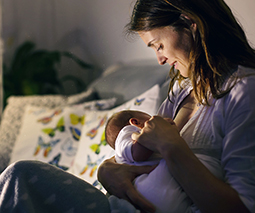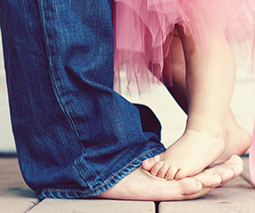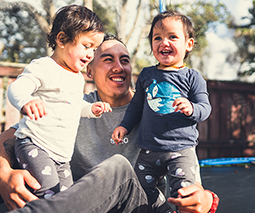Ain’t no tiger mama: Why quirky parenting labels do more harm than good

In social media land, parenting labels and monikers are quick to catch our attention. And the quirkier the name, like helicopter, tiger or hyper, the better.
Or so it seems.
Yet according to Warren Cann, a psychologist and the CEO of the Parenting Research Centre they have questionable value in the real world.
“I doubt the usefulness. Many of them don’t have a scientific basis and often based on anecdotal observation,” says Warren. “They’re also often used in an exaggerated way and criticise people for doing perfectly good things.”
Which is why when someone even jokingly refers to you as a ‘helicopter’ or ‘hyper’ parent you’re quick to Google the definition and then spend the day worrying you’re doing something wrong.
“They can make you feel like you’re doing something wrong and if someone assigns you the wrong label, it can potentially damage your confidence. And that is not very helpful,” says Warren.
“Don’t dismiss the styles altogether, there can sometimes be some interesting kernels in the information. But I think we are better served focusing on what is happening between us and our own child and our own approach, and learning what works.”
Listen to Warren on Feed Play Love:
Understanding your child’s temperament is the first piece of this puzzle
“Not long ago child psychology thought that children were born like a blank slate, and their personality got shaped by the way they were parenting,” says Warren.
“We know a lot more now. And we know children don’t come as a blank slate, they come into the world as active agents – ready and prepared to interact with the world.”
Which, in turn, will affect your behaviour and reactions.
“The way your child reacts and responds to the world is going to change how you react and respond to them,” says Warren.
“I am not trying to imply that we have good children and bad children. But that we have children with lots of different characteristics.”
These characteristics are reflected in a child’s temperament. And a child’s temperament greatly influences the way the child learns and understands their world – but it also influences your parenting style.
“What this means for parents is that issues and challenges can arise when there is not a good fit between temperament and situation or a child and parents’ temperament,” says Warren.
“If you are a multitasking parent with a quiet, dreamy child who takes forever to get the shoes on, you can imagine there is room for conflict. If you have a shy child, you can imagine that first day of kindy is going to be a nightmare – everyone is crying. But down the track, the teacher won’t be complaining about disruptive behaviour in the classroom.”
Read more on parenting:
- How to divorce-proof your marriage
- 7 ways to strengthen your relationship
- Chrissy Teigen’s toddler takes her first dance class
How can we re-jig our parenting style for our children’s benefit?
The first step is to fully accept your child’s temperament and understand it’s what makes them special and different.
“Putting pressure on your child to be someone they are not, will not work,” says Warren. “But you don’t have to reinvent your parenting totally for each child. Where we can be tricked into a trap is where you try something with one child and it works but with the next child it doesn’t work as quickly, so we give up.”
“It could be that the strategy was good, it was just that we needed to be more consistent and persistent because that child was going to take a bit longer to learn to adapt to the strategy.”
Adjust your parenting style not your strategy
Warren says all children have the same basic needs, but how they receive them and/or respond to our expression of those needs is different.
“For example, all children need affection and warmth, but what they like and how they respond will be different,” says Warren.
“Same goes with predictability and consistency in parental behaviour. Where some kids are really easy going and don’t respond negatively when we are inconsistent, a more reactive child will not cope so well.”
Warren gives the example of a parent who tells a child not to jump on the couch one day and the next day, when they are feeling more energetic, they seem okay with it.
“A more easy-going kid will be okay with that inconsistency, but other kids who are more reactive to things being out of order will likely be more upset by changes they can’t predict. So for those kids, we need to increase the amount of routine and predictability.”
Make your expectations as clear as possible
Boundaries are another parenting essential and according to Warren, we need to be as clear as possible about our expectations.
“Set simple and understandable rules … and having a consistent response when they break the rule or hurt or disrupt others,” says Warren.
“If you have a child with a more reactive temperament, then we need a higher degree of persistence and consistency to help the child ultimately learn the skills we want to teach them.”













